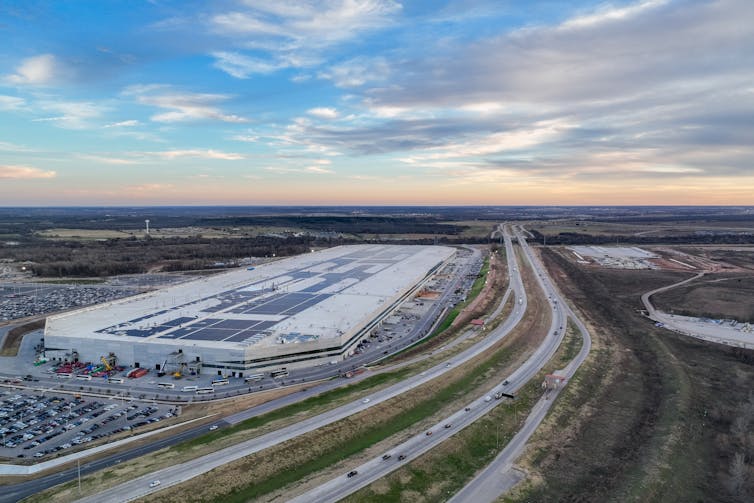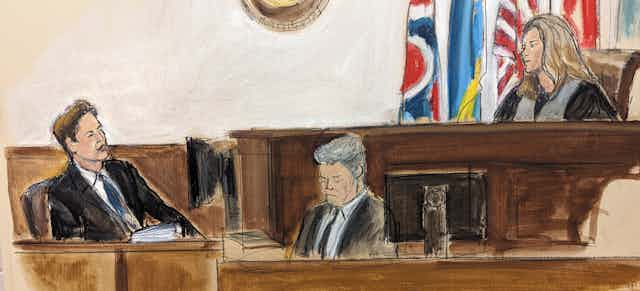Delaware Chancery Court Judge Kathaleen St. Jude McCormick has blocked Elon Musk’s US$55.8 billion pay package, which Tesla’s board of directors approved in 2018 through a process she found to be “deeply flawed.”
No CEO of a publicly traded U.S. company has ever been paid this much for one year’s work, according to Equilar, which tracks corporate leadership data. Pay for the 10 highest-paid executives, including Google’s Sundar Pichai and Apple’s Tim Cook, reportedly maxed out at around $250 million in 2022.
The Conversation asked Justin P. Klein, the director of the Weinberg Center for Corporate Governance at the University of Delaware, to explain McCormick’s reasoning.
Why did the judge block Musk’s pay package?
McCormick’s opinion began with a good question: “Was the richest person in the world overpaid?”
She concluded, in this reference to Musk – whose fortune was estimated to be worth $205 billion before the ruling and consists largely of his Tesla shares and stock options, along with his SpaceX stake – that he was.
This legal defeat may have knocked Musk out of his perch atop the Forbes list of the world’s richest people, making him the second-wealthiest, the media outlet calculated.
McCormick ruled against Musk in Tornetta v. Musk, a lawsuit filed on behalf of an investor who owned only nine Tesla shares – and by extension virtually all of the company’s stockholders. Ultimately, she determined that Musk’s compensation plan was considered and approved by a board of directors that was not sufficiently independent or objective.
The compensation plan was subject to a vote by the rest of Tesla’s shareholders. But the information they received left out key details and contained inaccurate statements.
This pay package deserved close scrutiny because of its enormity, McCormick observed. She called it the “largest potential opportunity ever observed in public markets by multiple orders of magnitude.”
What was wrong with Tesla’s board?
McCormick concluded that many of Tesla’s board members, including his brother Kimbal Musk, had close financial and social relationships with Elon Musk and that they were beholden to him due to these ties.
The board approved this compensation plan without following commonly accepted norms, according to the ruling. Further, McCormick found that the directors allowed Musk to control the process for approving the compensation plan, dictating the terms, amount and timing.
Board members apparently made no efforts to benchmark the plan as compared to compensation paid to executives of comparable companies, a critical and typical step in any situation like this.
Musk was in control of Tesla, a publicly traded company, that should have standard protocols in place regarding its compensation practices.
There was no negotiation between Musk and the compensation committee or the board regarding the amount and terms of the plan, the chancellor found. This is both inconsistent with widely accepted compensation setting practices and striking due to the scale of the pay package.
“Musk launched a self-driving process, recalibrating the speed and direction along the way as he saw fit,” McCormick wrote. “The process arrived at an unfair price. And through this litigation, the plaintiff requests a recall.”

What factors are boards supposed to consider in setting CEO pay?
In deciding what CEOs should earn, boards or compensation committees should consider the company’s performance under the leadership of the CEO and the executive’s own personal performance. They should also review what comparable companies take into consideration when making decisions about their own CEO’s compensation.
Other metrics or considerations may be taken into account, too. These may include whether the company has made progress in terms of diversity, equity and inclusion, employee retention, sustainability and environmental performance, worker safety practices, risk management and compliance with laws and regulations.
Around the time of this compensation decision, Musk was the subject of a Securities and Exchange Commission probe over alleged fraud stemming from what the SEC said were misleading statements regarding his plans to take Tesla private at $420 per share – a part of a tweet widely regarded as a cannabis joke.
The settlement Musk reached with the SEC forced him to pay a $20 million fine and step down as the company’s chairman for at least three years. It also required the appointment of two new independent Tesla board members and a requirement that he preclear certain public statements.
The company was not taken private.
In 2023, a jury found Musk not liable for related losses by Tesla investors who sued over the incident. Tesla shares closed at $187.91 on Feb. 2, 2024, far below that $420 price that unleashed litigation. The company’s share prices closed at $409.97 in November 2021 – the highest point to date.
The board could have considered this incident a negative factor when making its decisions about Musk’s compensation.
What process are boards supposed to follow in setting CEO pay?
In setting CEO compensation, all members of boards or compensation committees should be truly independent and objective, with no interest in the outcome.
They should consider engaging compensation experts and benchmark or seek information on executive compensation at comparable companies.
These decisions require careful consideration of all components of the CEO’s compensation and how the pay package should be structured. That includes how much of the pay should be provided as cash, restricted stock, which may not be sold for a period of time, and stock options, which provide the right to purchase stock at a predetermined price before a particular time in the future.
When stock prices rise a great deal, stock options soar in value. That’s what happened with Musk’s colossal pay package.
What happens now?
Musk may decide to appeal to the Supreme Court of Delaware. On the other hand, Musk could ask Tesla’s board, its compensation committee – or both of them – to revisit and revise his compensation plan, taking into account the objections spelled out in the ruling.
That would include both the amount – $55.8 billion – and the process by which it was set.
Musk, however, appears to be seeking a third option. “Tesla will move immediately to hold a shareholder vote to transfer (the) state of incorporation to Texas,” he posted on X, his social media platform previously known as Twitter.
Even if Musk were to prevail and change Tesla’s jurisdiction of incorporation, it would not be likely to affect this decision.
Is Delaware particularly tough on corporate leaders?
Delaware is the corporate home of more than 60% of Fortune 500 companies even though it’s the country’s second-smallest state.
One reason for its popularity with businesses of all kinds is that Delaware’s courts are quite experienced, with a great deal of expertise in considering business matters and cases of this kind. Musk’s court case was heard in its Court of Chancery, a system that primarily decides corporate legal matters.
Although Musk suggested that standards in Delaware are overly strict in another message he posted on X after the ruling, this kind of case is very rare.
One of few similar lawsuits was filed against former Disney CEO Michael D. Eisner over his $140 million severance package. In 2005, Chancellor William B. Chandler III of the Delaware Chancery Court let it go, while acknowledging the apparent impropriety of paying an executive so much.
“Despite all the legitimate criticisms that may be leveled at Eisner, especially at having enthroned himself as the omnipotent and infallible monarch of his personal Magic Kingdom,” Chandler wrote, “I nonetheless conclude, after carefully considering and weighing all the evidence, that Eisner’s actions were taken in good faith.”

